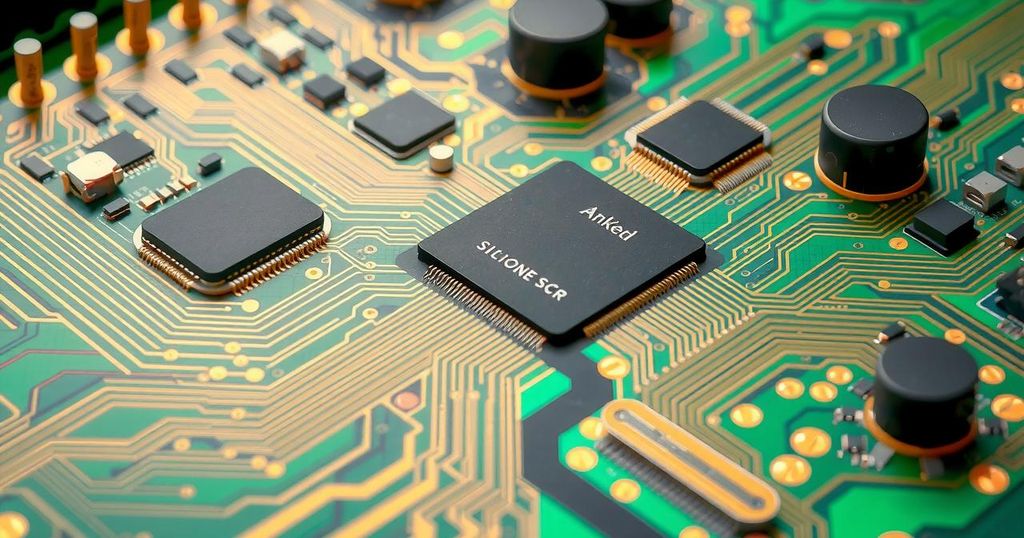Politics
ASIA, BEIJING, CHINA, DONALD TRUMP, GEOPOLITICS, HENKEL, INTELLECTUAL PROPERTY, MEXICO, NORTH AMERICA, RAM TRI, RAM TRICHUR, SEMICON, SHANGHAI, SUZHOU ZUNHENG, TARIFFS, TRADE, TRICHUR, UNITED STATES, US, US-CHINA RELATIONS, WASHINGTON, WUXI EVERGRAND ELECTRONIC SCIENTIFIC TECHNOLOGY CO, ZHOU DONGDONG
Clara Montgomery
Chinese Semiconductor Industry Advocates for Global Cooperation Amid Trade Tensions
Industry insiders at the Shanghai semiconductor fair advocated for increased global cooperation amidst rising trade tensions with the United States. Despite facing significant challenges from U.S. restrictions, experts believe such adversities could foster innovation within China’s burgeoning semiconductor market. China is making strides towards self-sufficiency while striving to establish stronger international ties.
At a semiconductor trade fair in Shanghai, industry insiders emphasized the necessity for increased collaboration between the Chinese chip industry and global partners, in the face of escalating trade tensions with the United States. Attendees crowded the Semicon expo, where exhibitors promoted various semiconductor-related products, from silicon wafers to chip testing equipment.
The rapid expansion of China’s semiconductor sector has encountered resistance from the U.S. and certain European nations, particularly with the recent blacklisting of numerous companies by Washington due to national security concerns. Former U.S. President Donald Trump had previously aimed to intensify trade restrictions against Chinese semiconductor firms while encouraging allies to limit their business engagements with China, in an effort to undermine its semiconductor market.
Despite these hurdles, Xiao Jincheng, co-founder of Suzhou Zunheng Semiconductor Technology Company, expressed aspirations for global expansion, stating the importance of future international cooperation. In recent years, China has actively pursued self-sufficiency in semiconductor manufacturing, with significant financial investments into a dedicated chip fund.
Ram Trichur, a semiconductor expert at Henkel, resonated with Xiao’s views, asserting that innovation in the semiconductor realm cannot thrive in isolation and requires a collaborative ecosystem. Numerous Chinese companies showcased their international partnerships at the fair, while others openly invited foreign interest.
However, a prevailing sense of caution emerged regarding discussions on trade restrictions, with several companies hesitant to broach the subject. Zhou Dongdong, a product manager at Wuxi Evergrand Electronic Scientific Technology Co., acknowledged the impact of U.S. limitations but suggested these challenges could galvanize advancements within China’s supply chain. Trichur also noted that obstacles could stimulate innovation among Chinese firms, potentially leading to breakthroughs.
Computer chips play a vital role in the global economy, integral to products ranging from household appliances to electric vehicles. Historically, China has been perceived to lag behind the U.S. in accessing advanced semiconductor technologies. However, the introduction of an AI chatbot by Chinese firm DeepSeek at a lower cost than U.S. rival OpenAI’s ChatGPT raised questions regarding the effectiveness of U.S. trade restrictions.
Yet, Chinese semiconductor companies continue to face significant challenges, exemplified by SMIC’s report of a drastic profit drop for 2024, due in part to deteriorating trade relations between China and the U.S.
In conclusion, industry experts at the Shanghai semiconductor fair highlighted the pressing need for enhanced global cooperation amid a climate of trade tensions. Despite the challenges posed by U.S. restrictions, there is a shared belief that these obstacles may stimulate innovation within China’s semiconductor sector. With computer chips being essential for modern technology, China’s pursuit of self-sufficiency and international collaboration could reshape its standing in the global market.
Original Source: www.rfi.fr








Post Comment